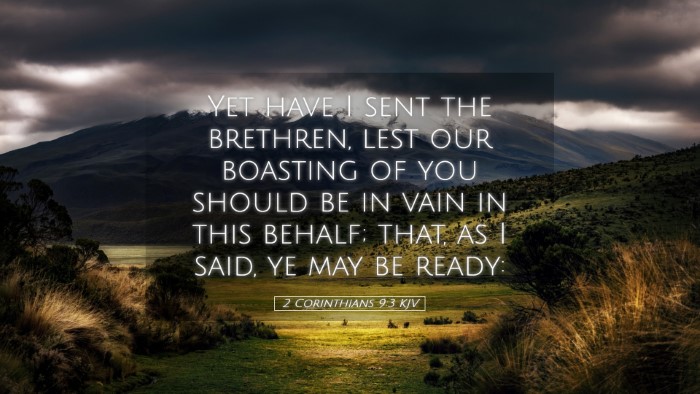Old Testament
Genesis Exodus Leviticus Numbers Deuteronomy Joshua Judges Ruth 1 Samuel 2 Samuel 1 Kings 2 Kings 1 Chronicles 2 Chronicles Ezra Nehemiah Esther Job Psalms Proverbs Ecclesiastes Song of Solomon Isaiah Jeremiah Lamentations Ezekiel Daniel Hosea Joel Amos Obadiah Jonah Micah Nahum Habakkuk Zephaniah Haggai Zechariah Malachi2 Corinthians 9:3
2 Corinthians 9:3 KJV
Yet have I sent the brethren, lest our boasting of you should be in vain in this behalf; that, as I said, ye may be ready:
2 Corinthians 9:3 Bible Commentary
Commentary on 2 Corinthians 9:3
Verse: "But I sent the brethren, lest our boasting of you should be in vain in this behalf; that, as I said, ye may be ready." (2 Corinthians 9:3)
Introduction
This verse serves as a pivotal point in Paul’s exhortation regarding the collection for the saints in Jerusalem. Here, the Apostle Paul expresses both his pastoral concern and a strategic approach to nurturing the generosity of the Corinthian church. The depth of his communication provides rich insights into the nature of Christian giving and communal responsibility.
Contextual Background
In the preceding chapters, particularly in 2 Corinthians 8, Paul initiates a discourse on generosity, contrasting the Corinthian believers' initial eagerness to participate in the offering with the actualities of their delayed response. This chapter aims to motivate them further and remind them of their commitment.
Paul’s Intentions
Paul’s intentions in sending brethren ahead of himself to the Corinthians was not merely practical but deeply relational. He desired not only to remind the Corinthians of their financial pledge but also to stir them towards readiness in performing acts of generosity.
Analysis of Commentary Insights
Matthew Henry’s Perspective
Henry emphasizes the importance of preparation in the act of giving. He notes that Paul’s mention of sending brethren serves a dual purpose: it not only acts as a reminder but also as a mechanism to encourage a sincere and unforced act of generosity. Henry points out that the notion of readiness is essential, as it signifies an attitude of willing participation rather than reluctant obligation.
Albert Barnes' Interpretation
Barnes elaborates on the principle that Paul's boasting about the Corinthians was not misplaced. His confidence in their readiness was predicated on their past eagerness; thus, by sending brethren, Paul sought to ensure that they would fulfill their commitment in a manner worthy of the boasting he had done. He underscores that this preparation was not merely for Paul's benefit but for the edification of the entire community and the Gospel mission.
Adam Clarke’s Commentary
Clarke provides a detailed exposition on the importance of communal acknowledgment in acts of giving. He posits that genuine giving arises from a community who is collectively aware of their duties. Paul's initiative to send brethren was to ensure that the Corinthians could receive instruction, encouragement, and support in their giving, reinforcing the notion that Christian generosity flourishes in a nurturing community landscape.
Theological Implications
The theological implications of this verse extend into several key areas:
- The Nature of Generosity: Generosity is presented not merely as an act but as a disposition of the heart which must be cultivated.
- Community and Accountability: The verse highlights the role of mutual accountability within the church. Paul’s act of sending brethren exemplifies the Christian call to support one another in our spiritual journeys.
- Preparation for Good Works: The emphasis on readiness prior to giving teaches that Christians should prepare themselves for good works, reflecting thoughtful and prayerful consideration in their charitable deeds.
Practical Application
For pastors, students, and theologians, this verse beckons a reflective approach towards stewardship and community responsibilities. There are several principles that can be distilled for practical application:
- Encourage Preparedness: Just as Paul sought to prepare the Corinthians, leaders should instill in their congregations the value of readiness in giving, which also includes spiritual and personal preparedness.
- Fostering Community Engagement: Building a culture where generosity is celebrated and modeled within the church can empower members to respond positively to calls for giving.
- Communicate Vision and Purpose: Like Paul, church leaders must communicate clearly the purpose behind collections, ensuring that church members understand the impact and necessity of their contributions.
Conclusion
2 Corinthians 9:3 serves as a powerful reminder of the ethos of Christian giving. Paul's strategic foresight and relational engagement with the Corinthian church transcend mere financial support, delving into the heart of community and accountability in Christ. By reflecting on this verse, church leaders and believers alike can cultivate an environment of generous, prepared, and joyful giving, ultimately contributing to the mission of the Gospel and the welfare of the broader Christian community.


